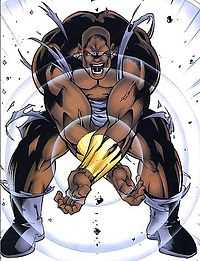Black Mass (comics)
| Black Mass | |
|---|---|
 Black Mass as seen in Joker: The Last Laugh, Secret Files and Origins (December 2001) | |
| Publication information | |
| Publisher | DC Comics |
| First appearance | Justice League of America #234 (December 1985) |
| Created by |
Gerry Conway (script) Chuck Patton (art) |
| In-story information | |
| Alter ego | Geoffrey Thibodeux |
| Team affiliations | Cadre |
| Abilities | Super-strength, gravity manipulation |
Black Mass is a fictional DC Comics supervillain. He first appeared in Justice League of America #234 (December 1985)
Fictional character biography
Geoffrey Thibodeux was a small-framed physicist who was granted a bulky body and gravity powers by wristbands provided by the Overmaster, who drafted him into the original Cadre under the alias Black Mass. Following their battle with the Justice League of America, Black Mass was sent to prison. Years later, he briefly lost his wristbands in a card game to Wally Tortolino, a reporter for 'Spy' magazine. Wally, armed with other weapons as well, went on a rampage but was stopped. Black Mass gained his wristbands back. Eventually the wristbands and their power bonded permanently with his body. During the Joker’s 'Last Laugh' riots at the Slab, Black Mass used his powers to draw the entire facility into a gravity well. A bullet to the head left Black Mass a vegetable,[1] but he retained his powers and is now the cellmate of Doctor Polaris, unwittingly keeping the magnetic villain's powers in check. Still brain damaged, Black Mass was last seen rejoining the Cadre under the leadership of Polaris in San Francisco. They fought the Power Company, who ultimately tricked Black Mass into betraying Polaris.[2] Presumably, they then shared a cell again.
Black Mass has recently resurfaced in Justice League of America #17, along with Crowbar and Nightfall, trying to leave America and escape capture. They were stopped by Black Lightning.
Black Mass met his demise off-panel and has been identified as one of the deceased entombed below the Hall of Justice.
In other media
Television
- Black Mass (alongside Cadre members Crowbar, Fastball, and Shatterfist) appears in the Justice League Unlimited episode "Clash." They were defeated by Superman and Batman. Black Mass later returns as a member of Gorilla Grodd's Secret Society.
References
| ||||||||